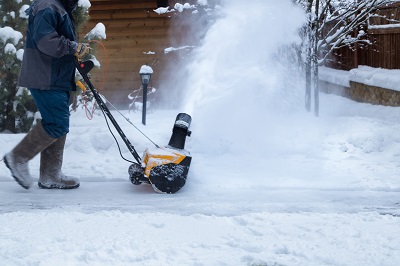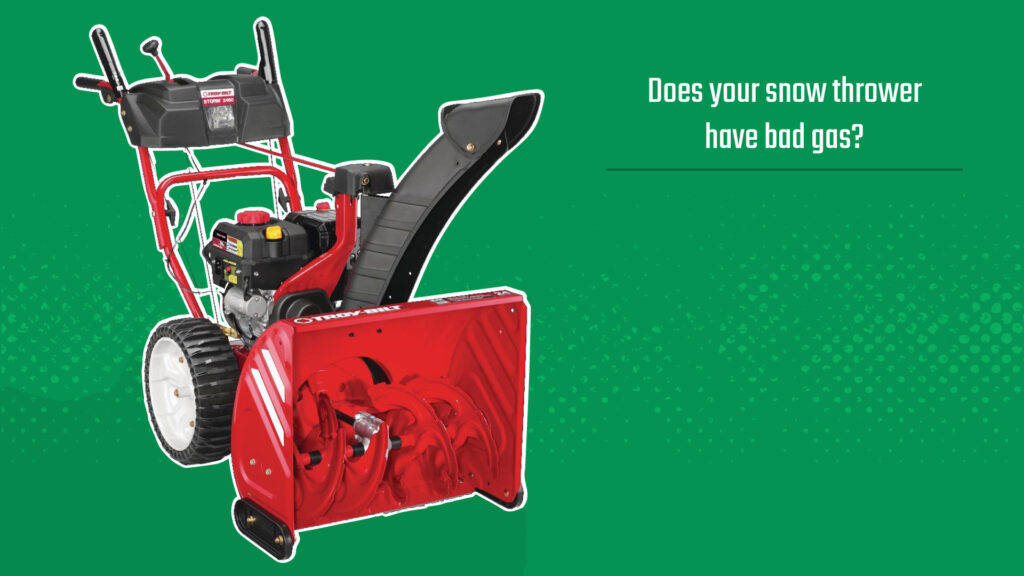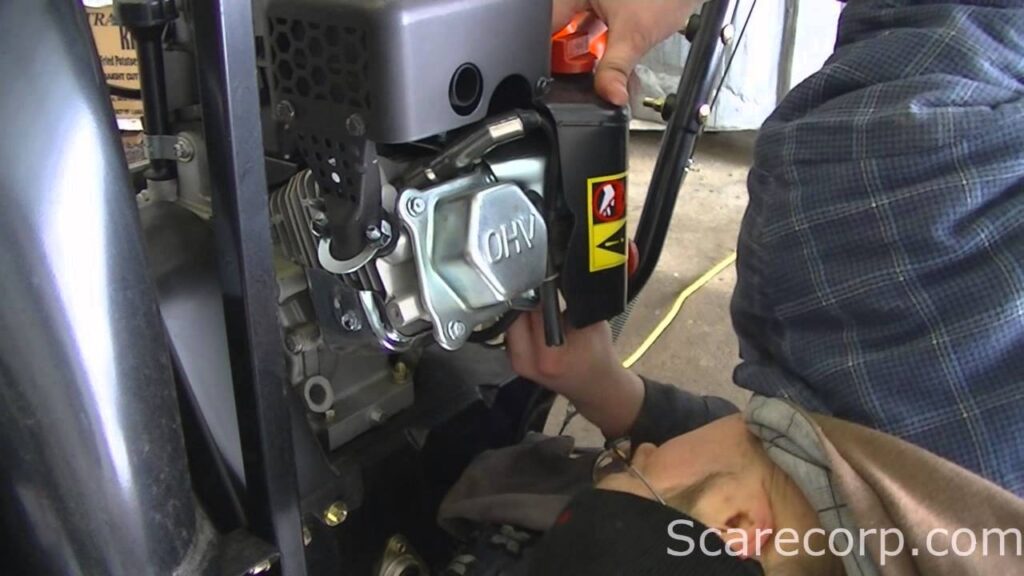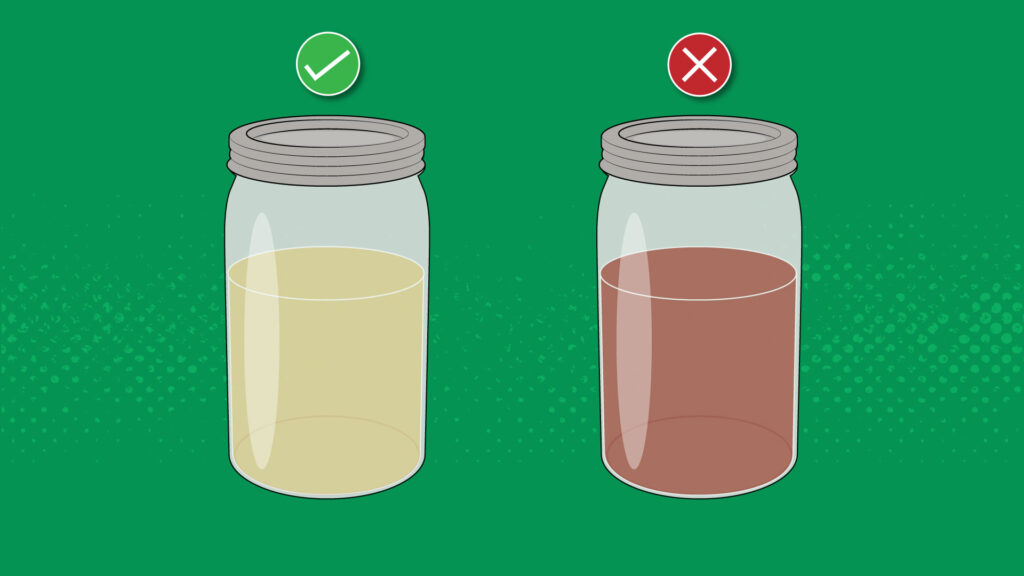As summer approaches, many of us are eager to retire our snowblowers until the next winter season. But before we bid them farewell, there’s an important question we must consider: is it bad to leave gas in snowblower over summer? We all want our equipment to function smoothly when the cold weather returns, so let’s uncover the truth behind this common dilemma and discover the best practices for storing our snowblowers during the summer months.
This image is property of lh6.googleusercontent.com.
Potential Damages of Leaving Gas in Snowblower Over Summer
Leaving gas in your snowblower over the summer can potentially cause several damages to your machine. It is important to understand the potential risks and take preventative measures to ensure your snowblower remains in good working condition. In this article, we will discuss the causes of fuel degradation, how it can lead to carburetor issues, and the possible damage it may cause to engine components. We will also provide tips and recommendations on proper fuel removal, storage, and maintenance to help you keep your snowblower running smoothly.
Fuel Degradation
Fuel degradation is a common issue that can occur when gasoline is left in the fuel tank of a snowblower over an extended period, such as during the summer months. Over time, the volatile elements in gasoline can evaporate, leaving behind a gummy residue that can clog the fuel system and affect the performance of your snowblower.
Causes of Fuel Degradation
Fuel degradation can be caused by various factors, such as exposure to oxygen, moisture, and heat. The combination of these elements can lead to the breakdown of the chemical composition of gasoline, resulting in the formation of gums and varnishes that can obstruct fuel lines, fuel filters, and carburetor jets.
Effects of Degraded Fuel on Snowblower Performance
Using degraded fuel in your snowblower can have a negative impact on its performance. The gums and varnishes formed by degraded fuel can clog the fuel system, obstructing the flow of fuel to the engine. This can lead to poor engine performance, difficulty starting the snowblower, reduced power output, and even engine stalling during operation.
How to Prevent Fuel Degradation
To prevent fuel degradation in your snowblower, it is recommended to either remove all the gasoline from the fuel tank or use a fuel stabilizer. If you choose to drain the fuel tank, ensure that you dispose of the gasoline safely according to local regulations. If you opt for a fuel stabilizer, select a high-quality product and follow the manufacturer’s instructions for proper usage.
Carburetor Issues
Leaving gas in your snowblower over the summer can also lead to carburetor issues. The carburetor is responsible for mixing fuel and air in the proper ratio for combustion, and when stale fuel is present, it can cause various problems.
Effects of Stale Fuel on Carburetor
Stale fuel can result in the buildup of deposits and varnish within the carburetor. These deposits can restrict the proper flow of fuel and air, leading to an imbalance in the fuel mixture. Consequently, this can cause poor engine performance, rough idling, difficulty starting, and even engine misfires.
Common Carburetor Problems
Some common carburetor problems that can arise due to leaving gas in your snowblower over the summer include clogged jets, stuck float valves, and gummed-up passages. These issues can impair the proper functioning of the carburetor, making it challenging for the engine to run smoothly.
Preventing Carburetor Issues
To avoid carburetor issues caused by leaving gas in your snowblower, it is recommended to drain the fuel tank and run the engine until all the fuel in the carburetor is used up. This will help prevent the buildup of stale fuel residues. Additionally, using a fuel stabilizer can also safeguard the carburetor from potential issues related to degraded fuel.
Engine Component Damage
Leaving gas in your snowblower over the summer can even result in damage to various engine components. The presence of degraded fuel and the effects of prolonged exposure can lead to corrosion, mineral deposits, and rust, which can negatively impact the overall performance and longevity of your snowblower.
Corrosion of Metal Parts
When gasoline degrades, it can produce corrosive byproducts that can eat away at metal parts within the fuel system and engine. This corrosion can weaken the integrity of components, causing them to fail prematurely or operate less efficiently. It can also contribute to leaks and decreased fuel efficiency.
Mineral Deposits and Rust
Degraded fuel can contain impurities and contaminants that can settle as deposits within the fuel system and engine. These mineral deposits can clog fuel lines, filters, and injectors, hindering the proper flow of fuel. Additionally, the presence of moisture, especially when combined with oxygen, can lead to the formation of rust on metal surfaces, further compromising the functionality and reliability of your snowblower’s engine.
Preventing Engine Component Damage
To prevent engine component damage due to leaving gas in your snowblower over the summer, regular maintenance is crucial. This includes draining the fuel tank, emptying the carburetor, and using a fuel stabilizer. Additionally, taking steps such as cleaning the snowblower, inspecting and lubricating parts, checking the spark plug, and covering the machine can help protect it from moisture and other damaging elements.
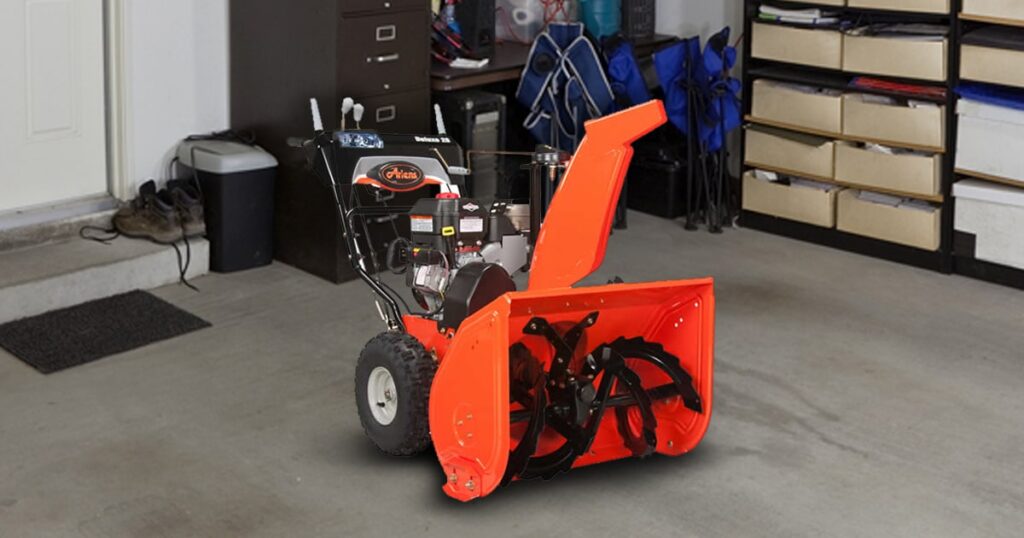
This image is property of www.snowblowersdirect.com.
Proper Fuel Removal and Storage
Proper fuel removal and storage practices are essential when preparing your snowblower for the summer months. By following these steps, you can ensure that your machine is ready to go when winter arrives.
Draining the Fuel Tank
The first step in the fuel removal process is to drain the fuel tank completely. This can be done by running the snowblower until the fuel is depleted or by using a siphoning device to extract the gasoline. Once the tank is empty, dispose of the fuel safely and in accordance with local regulations.
Emptying the Carburetor
After emptying the fuel tank, it is important to remove any remaining fuel from the carburetor. Follow your snowblower’s manufacturer guidelines to locate the carburetor and drain the fuel from it. This step helps prevent varnish and gum buildup in the carburetor, ensuring proper functioning when you use the snowblower later.
Using Fuel Stabilizer
To prevent fuel degradation, consider using a fuel stabilizer before storing your snowblower. Fuel stabilizers are additives that help preserve the quality and properties of gasoline over extended periods. They inhibit the formation of varnish and gums, keeping the fuel fresh and preventing potential issues.
Choosing the Right Storage Container
When storing any remaining fuel, it is crucial to select the right storage container. Choose one that is specifically designed for storing gasoline and is made from durable, non-reactive materials. Avoid using containers that have previously held other chemicals, as they may contaminate the fuel.
Essential Preparations Before Storage
Apart from fuel removal and storage, there are other essential preparations that should be made before storing your snowblower for the summer.
Cleaning the Snowblower
Thoroughly clean your snowblower before storing it. Remove any debris, dirt, or snow buildup from the auger, impeller, chute, and housing. Cleaning these parts prevents rust and corrosion, ensuring your snowblower remains in good condition during the summer months.
Inspecting and Lubricating Parts
Inspect all parts of your snowblower for any signs of wear or damage. Pay attention to belts, augers, impellers, and bearings. Replace any worn or damaged parts before storing the machine. Additionally, lubricate moving parts, such as the impeller shaft and auger bearings, to protect them from corrosion and ensure smooth operation.
Checking the Spark Plug
Check the condition of the spark plug and, if necessary, clean or replace it. A properly functioning spark plug is essential for starting your snowblower effortlessly when winter arrives. Follow the manufacturer’s instructions for proper maintenance of the spark plug.
Covering the Snowblower
To protect your snowblower from dust, dirt, and potential damage, cover it with a fitted cover or tarp. This will help keep it clean and safeguard it from moisture and other elements that can deteriorate its condition.
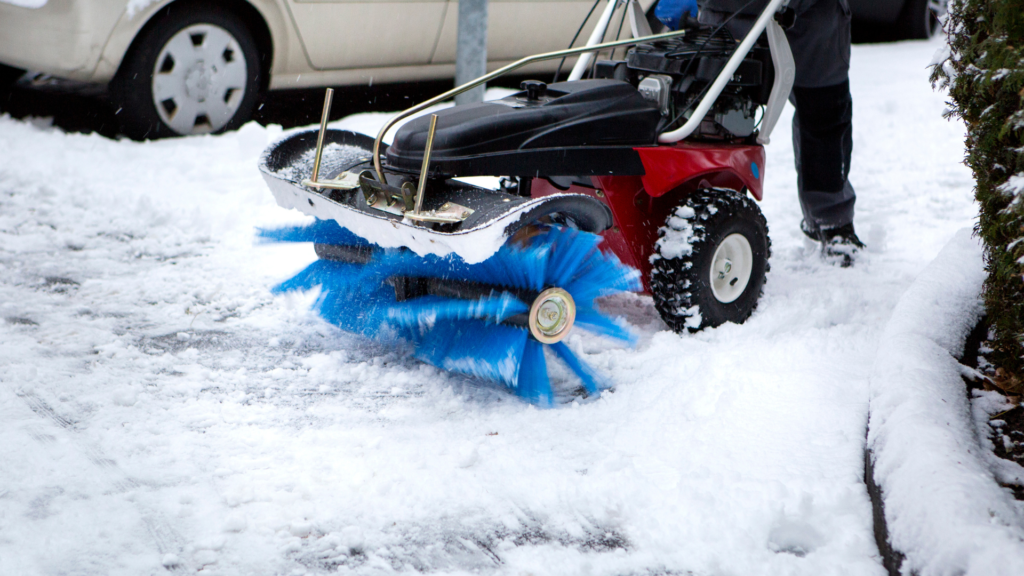
This image is property of sp-ao.shortpixel.ai.
Tips for Effective Maintenance
In addition to proper fuel removal, storage, and essential preparations, following these tips for effective maintenance will help ensure your snowblower’s optimal performance throughout its life.
Regularly Start the Snowblower
Even during the summer months, it is beneficial to start your snowblower periodically. Running the engine for a few minutes helps prevent fuel system clogs and lubricates critical components. However, ensure that you do not run the snowblower indoors or in an enclosed space due to the risk of carbon monoxide poisoning.
Keep the Fuel Fresh
If you choose to leave fuel in your snowblower during the offseason, it is essential to keep it fresh. Consider using a fuel stabilizer that is specifically designed for long-term storage. This will help preserve the fuel’s quality and prevent degradation, ensuring that your snowblower runs smoothly when you need it to.
Perform Seasonal Maintenance
Performing seasonal maintenance is crucial to keep your snowblower in optimal condition. Before the winter season, inspect and replace worn or damaged parts, lubricate components, and check the fuel system. Following the manufacturer’s maintenance schedule and guidelines will help prolong the life of your snowblower and prevent potential issues.
Long-Term Storage Recommendations
When it comes to long-term storage, where and how you store your snowblower can significantly impact its overall condition and lifespan.
Storing Indoors vs. Outdoors
Whenever possible, it is best to store your snowblower indoors. This helps protect it from moisture, extreme temperatures, and other potentially damaging elements. If indoor storage is not feasible, consider using a weatherproof cover or shed to shield your snowblower from the elements.
Protecting Against Moisture
Moisture is one of the primary enemies of any stored machine. To protect your snowblower against moisture, ensure that it is properly dried before storage. Store it in a dry location and use moisture-absorbing products, such as desiccant packs or silica gel, to reduce humidity levels.
Preventing Pests Infestation
To prevent pests, such as rodents or insects, from making your snowblower their home, take preventative measures. Clean the machine thoroughly before storage, seal any openings or gaps, and consider using deterrents such as mothballs or peppermint oil to discourage pests from settling in.

This image is property of gardeningtoolsite.com.
Common Questions About Leaving Gas in Snowblower
As leaving gas in a snowblower over summer can be a common concern, here are answers to some frequently asked questions related to this topic.
Can I just leave the gas in the snowblower?
Leaving gas in your snowblower for an extended period, such as over the summer, can lead to fuel degradation and potential damage to the machine. It is best to either remove the gas or use a fuel stabilizer to preserve its quality.
What happens if I leave gas in the snowblower?
Leaving gas in your snowblower over the summer can result in fuel degradation, carburetor issues, and engine component damage. These can cause poor performance, starting difficulties, and reduced overall lifespan of the machine.
Can I use the old gas in the snowblower?
Using old gas in your snowblower is not recommended, as it can have degraded properties that can negatively affect the machine’s performance. It is best to use fresh fuel or properly treated fuel to ensure optimal operation.
Can I store the snowblower without removing the gas?
While it is possible to store a snowblower with gas in it, it is generally not recommended. By removing the gas or using a fuel stabilizer, you can minimize the potential risks associated with leaving gas in the machine and help maintain its overall performance.
Conclusion
Leaving gas in your snowblower over the summer can lead to various potential damages, including fuel degradation, carburetor issues, and engine component damage. To prevent these issues, it is crucial to properly remove and store the fuel, follow essential preparations before storage, and perform regular maintenance. By following these recommendations and taking proactive measures, you can ensure that your snowblower remains in excellent condition and is ready to tackle the winter season efficiently.

This image is property of snowblowerhelp.com.
